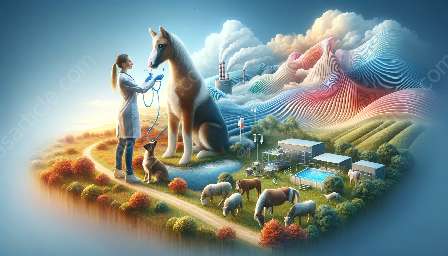Veterinary genetics is an intriguing field that plays a crucial role in animal health. By understanding the genetic makeup of animals, veterinarians can identify disease risk factors, develop treatments, and enhance breeding programs to ensure the overall well-being of both domestic and wild animal populations.
The Relevance of Veterinary Genetics in Veterinary Sciences
Veterinary genetics is an essential component of veterinary sciences, as it provides a scientific foundation for diagnosing and treating inherited diseases in animals. Through genetic testing and analysis, veterinarians can identify genetic mutations and predispositions that contribute to various health conditions in animals. This knowledge is instrumental in guiding treatment strategies and developing targeted therapies to improve the quality of life for animals.
The Applications of Veterinary Genetics in Veterinary Sciences
One of the key applications of veterinary genetics in veterinary sciences is in the identification of genetic disorders in animals. By leveraging advancements in genomics and molecular biology, veterinarians can pinpoint the underlying genetic causes of conditions such as hip dysplasia, heart disease, and certain types of cancer in animals. This knowledge enables them to offer personalized healthcare solutions tailored to the individual genetic profiles of their animal patients.
Furthermore, veterinary genetics plays a vital role in enhancing animal breeding programs. Through selective breeding based on genetic traits, veterinarians can help mitigate the prevalence of hereditary diseases and promote desirable traits in animals. This contributes to the overall improvement of animal populations in terms of health, temperament, and performance, thereby benefiting various sectors such as agriculture, companion animal industries, and wildlife conservation.
Moreover, veterinary genetics is instrumental in the field of pharmacogenomics, where the variations in drug metabolism and response based on an animal's genetic makeup are studied. This personalized approach to pharmacology allows veterinarians to optimize medication choices and dosages, leading to more effective treatments and reduced risk of adverse drug reactions in animals.
Veterinary Genetics in Applied Sciences
Beyond its implications in veterinary sciences, veterinary genetics intersects with various disciplines within applied sciences. In the realm of biotechnology, veterinary genetics contributes to advancements in gene editing technologies such as CRISPR-Cas9, allowing for the targeted modification of animal genomes to address genetic disorders and enhance desirable traits.
Furthermore, veterinary genetics plays a significant role in the emerging field of conservation genetics, where genetic diversity and population dynamics in endangered species are studied to inform effective conservation strategies. By elucidating the genetic factors influencing the viability of animal populations, conservationists and wildlife biologists can make informed decisions to preserve genetic diversity and mitigate the risk of extinction in vulnerable species.
The Future of Veterinary Genetics
As advancements in genetic technologies continue to unfold, the future of veterinary genetics holds immense promise. The ability to sequence and analyze animal genomes at unprecedented speed and accuracy opens doors to new diagnostic tools, personalized treatments, and innovative breeding strategies that can revolutionize animal health and welfare. Additionally, the integration of veterinary genetics with other cutting-edge fields such as bioinformatics, artificial intelligence, and regenerative medicine paves the way for a comprehensive and multidisciplinary approach to advancing animal healthcare.
In conclusion, veterinary genetics stands at the forefront of driving advancements in veterinary and applied sciences, offering transformative insights and applications that have the potential to revolutionize the way we perceive and manage animal health and welfare. Embracing the complexity and diversity of animal genomes, veterinary genetics is poised to continue shaping the future of animal care and conservation, ushering in an era of unprecedented possibilities.

